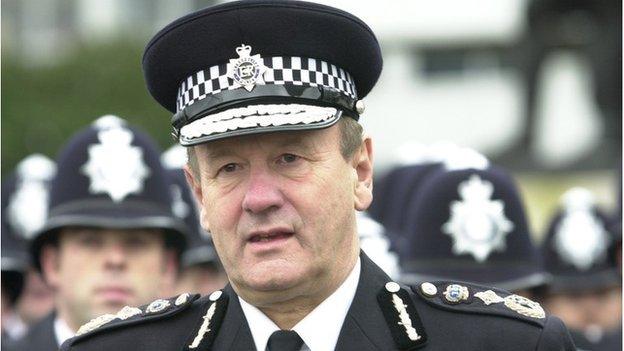Why the IPCC needs to win over its doubters
- Published
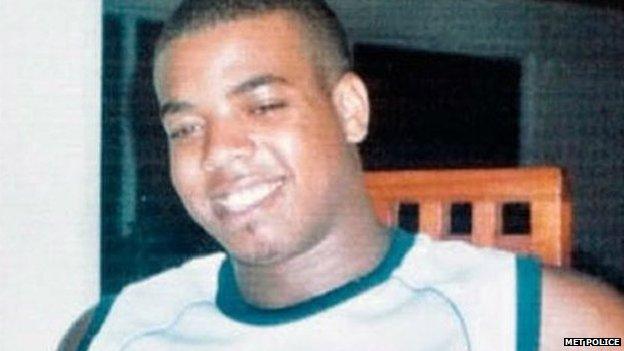
Azelle Rodney was shot six times during a Met Police operation to arrest an armed gang
When the policeman who had shot dead the suspected armed robber, Azelle Rodney, in north London was cleared of murder earlier this month, an email quickly dropped into my in-box.
It was a statement from Susan Alexander, Azelle Rodney's mother.
She wrote about how her 24-year-old son's death in April 2005 was "avoidable" and called on the Metropolitan Police to say sorry.
Significantly, she also asked for an "unreserved apology" from the Independent Police Complaints Commission (IPPC) for conducting a "wholly inadequate investigation" into the shooting.
"A better investigation may have resulted in a trial nine years ago," she said. "I can never get those years back - the IPCC must stop failing families in this way."
It is strong criticism that has frequently been levelled at the IPCC since it replaced the Police Complaints Authority, external - an organisation which was derided as ineffectual - in 2004.
The intention was that the new body, with offices across England and Wales, would bring more rigour, transparency and independence to the system for investigating allegations of police wrongdoing after failings were exposed during the Macpherson inquiry into the murder of Stephen Lawrence.
But relatives like Susan Alexander, whose family members have died at the hands of the police, have often found themselves let down by the way the IPCC has handled their cases.
After Jean Charles de Menezes was shot dead in 2005, the IPCC had to review its security procedures when one of its employees leaked crucial details of the case to the media., external
The IPCC admitted there were "investigatory gaps" in its inquiry into events leading to the murder of Maria Stubbings in Essex in 2008 and later reopened the case.
In 2011, the IPCC wrongly suggested that Mark Duggan had opened fire before he was fatally shot by police. The organisation apologised for that mistake - and for failing to give Mr Duggan's family enough support.
'Not a lot of progress'
Helen Shaw, co-director of Inquest, which helps the bereaved following deaths in custody, says although the IPCC is trying to improve the way it deals with families, they are still not at the "centre" of the process.
"During the last few years they've made some real effort to consult with families and stakeholders - and they want to talk to us again. But there's not a lot of progress," she says.
Susan Alexander's concerns in the Azelle Rodney case centred on the initial IPCC investigation, which found no significant fault with the police operation that led to her son's death and which did not lead to criminal charges against the officer involved.
A prosecution was brought only after an inquiry, held in public in 2012, uncovered new evidence.
In its defence, the IPCC says it carried out an extensive investigation into Azelle Rodney's death but it was advised at the time that it was not possible to obtain some of the material which later emerged during the inquiry.
Nevertheless, there are echoes of that case in the flawed IPCC investigation into the death of Sean Rigg in south London in 2008.
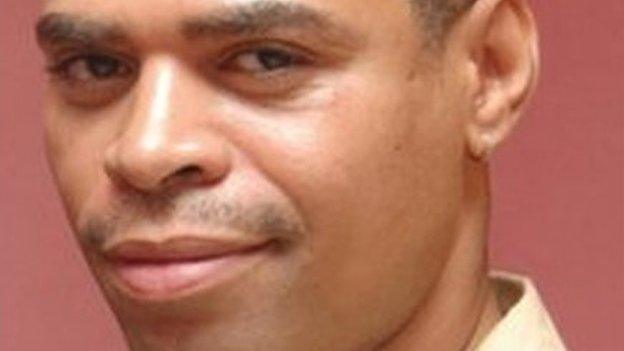
Sean Rigg died at Brixton police station
After fresh evidence emerged at the inquest, an external review was ordered which said the IPCC hadn't been "robust" enough in its inquiries.
The IPCC conducted a new investigation and last week, a police sergeant involved in the case was charged with perjury in relation to evidence he gave at the inquest.
Ms Shaw says even though the watchdog appears to make steps in the right direction in the immediate aftermath of a critical report, its investigations are sometimes still "not good enough".
"There's learning when there's a lot of pressure, but it doesn't seem to be an organisation that's able to sustain the learning," she says.
"It takes it on board then slips back to its old ways."
Striving for independence
It is, of course, an enormously challenging task to maintain the confidence of families who find themselves in the most desperate of circumstances and are seeking explanations that are hard to find.
But the police, the subject of the complaints the IPCC examines, do not appear to be satisfied with the standard of its investigations either.
Kevin Hurley, Police and Crime Commissioner for Surrey, who served as an officer in London for 32 years, says the quality leaves much to be desired.
"There's a lack of competence in basic evidence-gathering," he says.
One of the key problems the IPCC has always faced is that as it strives to be independent of the police service, recruiting people from a range of professional backgrounds, it loses out on investigative skills that police have in abundance.
In any standard criminal case involving a fatal shooting, an unexplained death or corruption, specialist detectives would be best placed to investigate.
But the perception that it is the "police investigating the police" means that the IPCC has to limit the number of former police officers it can take.
About 75 per cent of the 804 IPCC staff have no policing background - either as an officer or member of police civilian staff.
Of its 306-strong investigative pool, 60% have never worked for the police.
Although new IPCC investigators are given training, Mr Hurley says it takes years to achieve the necessary expertise in sifting through complex evidence, interviewing reluctant witnesses and assessing culpability.
"They're trying to get people from zero to SIO [Senior Investigating Officer] in 15 to 20 weeks - it simply can't be done," he says.
Rising caseload
In a statement, the IPCC says lessons from the review into the Sean Rigg case are being put into practice with improved training and guidance for staff:
"We have boosted our internal review and quality assurance processes as well as overseeing continuous professional development for all investigators," the IPCC says.
"In cases where we may have got it wrong, although it takes time, we are putting it right," it explains.
The issue of skills and training has become more acute as the IPCC has expanded, growing by almost 250 staff in the last year alone, with a further 200 expected to join by 2016.
Its remit has been widened to include the investigation of all serious and sensitive police cases, in addition to its ongoing work on the Hillsborough disaster, for which there is a dedicated team.
And the rising caseload has fuelled concerns about delays in completing investigations.
In its last annual report, the IPCC admitted: "The increase in workload has had an impact on the timeliness of investigations."
"In 2013/14 we aimed to complete half our investigations within 157 working days [more than five months] but achieved this in just over a fifth of cases closed."
Orgreave controversy
Last month, the watchdog was severely criticised for announcing that it would not conduct an investigation into allegations of police brutality and misconduct during clashes with miners at the Orgreave coking plant in South Yorkshire in 1984.
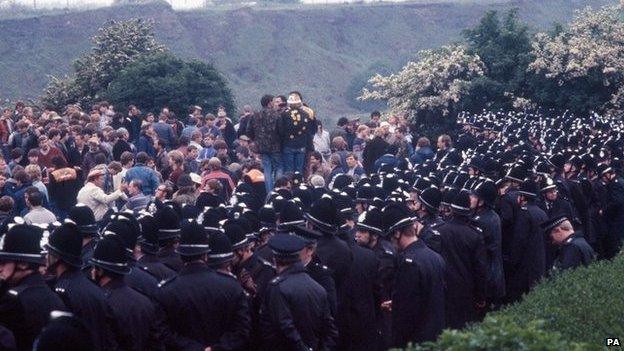
Thousands of miners and police clashed at the Orgreave coking site in South Yorkshire
It had taken the IPCC two-and-a-half years to reach that conclusion.
Gavin Thomas, vice-President of the Police Superintendents Association, says his members' main gripe about the IPCC is the "inordinate amount of time to get to a decision" which is sometimes "disproportionate" to the gravity of the case.
The effect on officers, as they wait for findings that could affect their career and livelihood, is considerable, he says.
"You have a high degree of anxiety and stress. Some people's lives are on hold for an extended period of time."
The IPCC says the extra staff and resources it has been given are leading to "benefits", with more investigations completed than ever before.
But it warns: "Even with the positive changes, the timeliness of our investigations will continue to be affected by matters outside of our control, such as waiting for key expert evidence, the co-operation of witnesses and for the conclusion of other processes such as criminal trials and inquests."
Two years ago, the IPCC's performance was heavily criticised by the House of Commons Home Affairs Committee, which said it was "woefully under-equipped".
Labour entered the last general election with a pledge to abolish the body that it had created and replace it with a watchdog with more teeth.
However, with the extra funding, staff and responsibilities that the government has provided - the IPCC's future is secure, for the next five years at least.
It will, though, have to redouble its efforts to convince the doubters - on both aides of the fence - that it is up to the job.
- Published8 July 2015

- Published3 July 2015
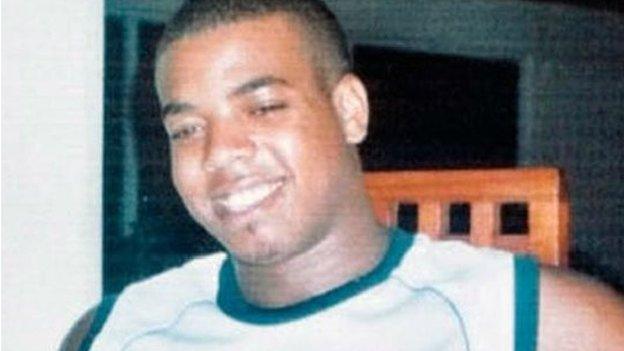
- Published9 April 2015
